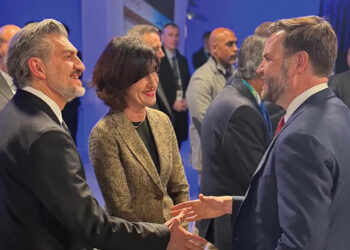When spectators settled into the auditorium of the Griboyedov Theater on November 5–6, 2025, they entered an aesthetic zone where a monstrous act of devotion performed itself. The work Cactus—written by, directed by and starring Renata Litvinova—stages love as an elemental force that pierces identity, narrative and social temporality.

Litvinova performs Cactus as a monologue of endurance and desire. A woman prepares a suitcase, listens to the distant murmur of war from the radio, speaks to a pigeon, and tends a cactus that quietly transforms into a human being. The action remains minimal; the atmosphere unfolds like perfume—dense, suspended, radiant. The scenography draws a geography of shadows: luminous sands, mirrored reflections, and drifting dust of light. Each scene unfolds as an interior vision, a private desert.

Costumes by Demna Gvasalia form the architecture of Litvinova’s presence. The sculptural gowns—metallic, severe, tender in fabric but monumental in line—turn the body into a landscape of memory. Demna’s couture functions as philosophy: structure becomes thought, silhouette becomes emotion.


The music by Zemfira Ramazanova builds the fragile emotional architecture of the performance. Her score glows with trembling introspection—enchanted, sorrowful, yet luminous from within. Each track breathes through transparent textures: delicate arpeggios, suspended chords, echoing fragments of voice. The sound operates as consciousness. Zemfira composes a sound-mirror for Litvinova’s monologue. The music listens. It observes. It inhales. Its fragile beauty carries a sense of distance—melancholy transfigured into gentleness.

The heroine of Cactus exists in waiting. Yet this waiting acts as creative practice. Time bends around her; she inhabits slowness as an aesthetic field. Her gestures, pauses, and monologue create a rhythm beyond causality. Waiting becomes a liturgy of existence.
The cactus anchors the work as a living metaphor. It thrives in scarcity, preserves moisture under a skin of thorns, and blooms unexpectedly in the desert. In Litvinova’s symbolic logic, the cactus becomes an emblem of love’s persistence. It grows silently, listens, remembers.

The metamorphosis of the cactus into a man evokes a ritual of transfiguration. It belongs to the realm of dream-logic rather than narrative. Through it, Litvinova offers a metaphysics of attachment—how affection takes root, how solitude germinates into devotion, how patience becomes flesh.
Litvinova’s glamor operates as a spiritual gesture. The spectacle of couture, the melancholy of music, and the ascetic minimalism of movement coalesce into an act of resistance through beauty. Glamor becomes liturgy, costume becomes confession, silence becomes prayer.

Tbilisi becomes both desert and garden. In its soil, Cactus plants itself as a symbol of endurance—thorned, luminous, patient. The performance radiates with the sense of an impossible tenderness: the miracle of blooming where no rain falls.
Litvinova, Zemfira, and Demna together create a fragile monument to love and survival. The cactus listens, breathes, and finally flowers. Through its quiet persistence, the audience discovers a new theology of beauty—one that trembles, glows, and endures.
Review by Ivan Nechaev














